

How China's 'social credit' system blocked millions of people from travelling. Read Story Transcript Millions of people were blocked from buying airline tickets or booking train journeys in China last year after being blacklisted under the country's controversial "social credit" system.
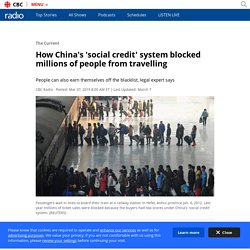
The National Public Credit Information Center revealed in its annual report that people with low scores had been blocked from buying airline tickets 17.5 million times in 2018, according to the Associated Press. People were barred from buying train tickets 5.5 million times, and 128 people were blocked from leaving the country due to unpaid taxes, the report said. Additionally, there were 290,000 instances where a person's low score stopped them from getting a senior management job or acting as a company's legal representative. Sea Atlases at the Harvard Map Collection. Ontario to ban cellphones in classrooms next school year. Cellphones will be banned in Ontario classrooms during instructional time, starting in September.

Education Minister Lisa Thompson said in a statement Tuesday that a formal announcement is coming soon. "Ontario's students need to be able to focus on their learning — not their cellphones," she wrote. "By banning cellphone use that distracts from learning, we are helping students to focus on acquiring the foundational skills they need, like reading, writing and math. " Some schools already have similar policies, but the province will issue a directive to all public schools for the 2019-20 school year, government sources told The Canadian Press. We’ve just had the best decade in human history. Seriously. Let nobody tell you that the second decade of the 21st century has been a bad time.
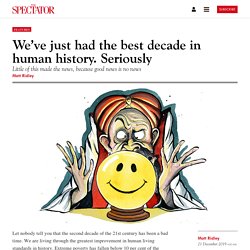
We are living through the greatest improvement in human living standards in history. Extreme poverty has fallen below 10 per cent of the world’s population for the first time. It was 60 per cent when I was born. Global inequality has been plunging as Africa and Asia experience faster economic growth than Europe and North America; child mortality has fallen to record low levels; famine virtually went extinct; malaria, polio and heart disease are all in decline. Circular economy EU action plan. The Private Debt Crisis : Democracy Journal. Why does the IMF keep badly missing its global growth forecast?

And what does that have to do with the 2016 presidential election? How Fentanyl Ingredients From China End Up in the U.S. Ye Chuan Fa was right at his own cubicle, also wearing a thick coat.

As the Amys introduced him, he stood up and stuck out his hand. He didn’t speak any English, but smiled and offered a chair and his business card, which had his information in Chinese characters on one side and in English on the other. He didn’t seem suspicious, nor ask any personal questions. Timeline of Earth. Human Terrain. Commondreams. The True Size Of ... Population Pyramids of the World from 1950 to 2100 - PopulationPyramid.net. View Global Data Explorer. PBDB Navigator. How We Share the World. This interactive graphic shows how the world is divided according to six different socioeconomic variables.
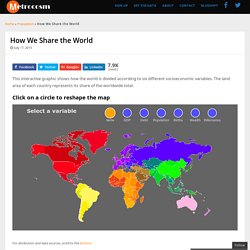
The land area of each country represents its share of the worldwide total. Click on a circle to reshape the map. Globally Is Life Better Today Than in Past? Current economic conditions a key factor in assessing progress By Jacob Poushter Fifty years ago, the world was a very different place.
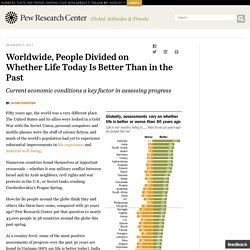
The United States and its allies were locked in a Cold War with the Soviet Union, personal computers and mobile phones were the stuff of science fiction, and much of the world’s population had yet to experience substantial improvements in life expectancy and material well-being. Numerous countries found themselves at important crossroads – whether it was military conflict between Israel and its Arab neighbors, civil rights and war protests in the U.S., or Soviet tanks crushing Czechoslovakia’s Prague Spring.
How Julian Simon Defeats Thanos. “The universe is finite, its resources finite.
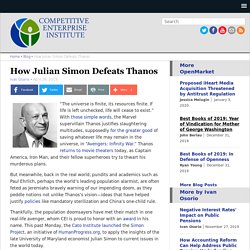
If life is left unchecked, life will cease to exist.” With those simple words, the Marvel supervillain Thanos justifies slaughtering multitudes, supposedly for the greater good of saving whatever life may remain in the universe, in “Avengers: Infinity War.” Thanos returns to movie theaters today, as Captain America, Iron Man, and their fellow superheroes try to thwart his murderous plans. Chinese New Year. The Origins and Practices of Holidays: Imbolc, Setsubun, Lunar New Year. The Case for More Immigration : Democracy Journal. About 232 million people, roughly 3 percent of the world’s population, are immigrants.

Just over 40 million of them are in the United States, accounting for just over 13 percent of the U.S. population. Immigrant flows between countries are largely driven by different levels of development. Immigrants leave poorer nations and move to richer ones where they can earn higher wages. Once the immigrants arrive in their destination countries, they impact the economy of their new homes in positive ways that boost long-run economic growth.
Immigration. Think about it. Why are you so afraid of tax? Last updated 07:51, September 17 2017 "We are not a highly taxed nation," says Shamubeel Eaqub.
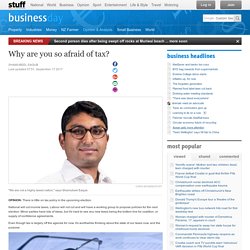
OPINION: There is little on tax policy in the upcoming election. National will cut income taxes, Labour will not cut and will have a working group to propose policies for the next election. Brian Fallow: Time to end the tax experiment, to ease property pressure? New Zealand's tax system is exceptionally distortionary with respect to housing - but the way to correct that is not to tax housing more harshly, but retirement saving more lightly. That is the thesis advanced by Otago University economist Andrew Coleman in a recent paper, Housing, the 'Great Income Tax Experiment' and the intergenerational consequences of the lease. He argues that there is nothing unusual about the way New Zealand taxes owner-occupied housing. People buy, or pay off, their homes out of after-tax income but neither the imputed (avoided) rents they gain nor the capital gain upon sale are taxed.
Enter The Dragon: Chinese Tech Giants Challenge The West. The rise of China as an innovation superpower – part two This is the second of a two article series on the rise of China. When Dissent Became Treason. America and the Great War: A Library of Congress Illustrated History by Margaret E. Wagner, with an introduction by David M. Kennedy Bloomsbury, 371 pp., $45.00. The War Was Won Before Hiroshima—And the Generals Who Dropped the Bomb Knew It. Visitors to the National Air and Space Museum—America’s shrine to the technological leading edge of the military industrial complex—hear a familiar narrative from the tour guides in front of the Enola Gay, the plane that dropped an atomic weapon on the civilians of Hiroshima 70 years ago today. We Didn't Have to Drop the Bomb. Seventy years ago this week, the United States ushered in the age of nuclear terror by dropping atomic bombs on the Japanese cities of Hiroshima and Nagasaki, killing an estimated 200,000 and injuring another 100,000 who would eventually succumb to their wounds or radiation poisoning.
At the time, the American public was led to believe that the bomb helped end the war and “saved lives.” This was never true. As commemorations occur around the world to reflect on the bomb and its centrality to our past and present lives, it is an appropriate time to ask, “Was the use of nuclear weapons against civilians necessary for victory in Japan?” There is a trove of information revealing that many senior U.S. military officials believed the bombs were not needed to end the war in the Pacific. President Truman approved of Hiroshima and Nagasaki’s destruction, but many of the top-ranking brass, from Douglas MacArthur to Chester Nimitz, knew better.
The Real Reason America Used Nuclear Weapons Against Japan. It Was Not To End the War Or Save Lives. Like all Americans, I was taught that the U.S. dropped nuclear bombs on Hiroshima and Nagasaki in order to end WWII and save both American and Japanese lives. But most of the top American military officials at the time said otherwise. Eco.logic.
Govern.Mental. SCIENCE Breakthroughs. Socio.Logical. Systemic. US.A.ID. WEATHER. Planetary. Eternity. Futuresque. Engineerable Feats. Edgy. Peopled Experiences. Skillsets. Thought Brigade. Time Well Spent.
Escapades. Less is more. More or less.